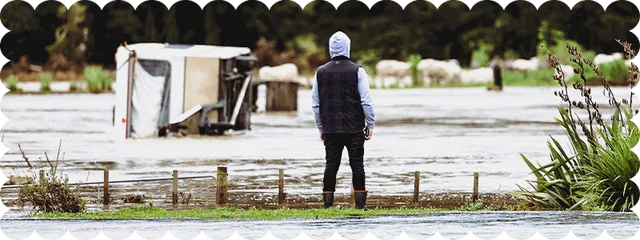Inflation to hit 30-year high
Three generations haven't experienced high inflation as adults and that’s about to change.
Mōrena and welcome to The Bulletin for Wednesday, April 20, by Anna Rawhiti-Connell. Presented in partnership with Z Energy.
In today’s edition: disquiet over health reforms; CCTV cameras everywhere; apartments – less risky and more of them; but first, low-inflation generations are no more.
Grant Robertson (Photo by Mark Mitchell - Pool/Getty Images)
“Hellish”, “monster”.
That was the language used by economists yesterday in forecasting the March quarter inflation result ahead of Stats NZ releasing its Consumer Price Index (CPI) data on Thursday. Most are predicting a number with a 7 in front of it. Westpac senior economist Satish Ranchhodis said the result is set to “be another monster”. Cameron Bagrie described the forecasted number as “hellish” and is concerned we could end up like mice on a wheel – with wages rising to meet inflation and pushing up costs even more. As Liam Dann points out (paywalled), it will likely be the highest rate we’ve seen since 1990.
Low-inflation generations no more.
When former Federal Reserve chairman Paul Volcker died in 2019, the Washington Post described Gen X, Millennials and Gen Z in the US as the “low-inflation generations”. It suggested Volcker had crippled inflation forever. At the time, 60% of working-age Americans had never seen inflation above 4%. Like most of us, they hadn’t factored in a pandemic and inflation currently sits at 8% in the US. If the history of inflation in this country isn’t easily retrievable from the recesses of your mind, or you literally weren’t born the last time we went through this, I recommend this summary from Kiwibank’s Mary Jo Vergara. We now have close to three generational cohorts who have not experienced high inflation as adults. It’s about to fall off the background wall of economic concepts and right into our laps.
Reserve Bank not in a great place on inflation.
Reserve Bank governor, Adrian Orr, conceded as much while speaking to the International Monetary Fund (IMF). His comments about the bank needing more support to constrain inflation without creating a recession have been read as a suggestion that there needs to be a changed approach to government spending. Opposition finance spokesperson, Nicola Willis, has described Orr’s words as a warning, adding that now was not the time to put “fuel on the fire” with big spending allowances in the May budget.
Robertson fronts questions on inflation.
Speaking to Morning Report yesterday morning, Robertson wasn’t keen to speculate on where the rate will land on Thursday but did say he didn’t think inflation had peaked yet. Yesterday afternoon, as acting prime minister while Ardern is overseas, he fronted the post-cabinet press conference. He maintained the position that government spending was not the driver of inflation (pointing instead to offshore pressures), spoke to the “infrastructure deficit” they were dealing with and announced three new projects, with approval fast-tracked, including a wind farm and two housing developments. He downplayed Orr’s comments saying “he made those comments in the context of all central banks around the world”. He also challenged “opposition politicians, in particular the National Party who actually said over the last few weeks said they would spend exactly the same amount as we would, just in a slightly different and less targeted way”.
A note from deputy editor Alice Neville:
While most vaccine mandates have ended and the occupiers have left parliament grounds, the story is far from over. As Covid continues to spread, so does mis- and disinformation, which makes fact-based and level-headed journalism more important than ever. We’re keeping a close watch on this ongoing story, from the inadequate regulation of disturbing online content, to those trying to turn the parliament occupation fury into a political force, to the next target of the protest ringleaders.
But we can’t do this – or the award-winning collaborations between Toby Morris and Siouxsie Wiles, painstakingly, sensitively reported investigations or up-to-the-minute live updates – without your support. As we continue to struggle against commercial pressures, contributions from our members are more critical than ever.
If you want to support what we do, please consider becoming a member today. Donate now.
Health reform rumblings.
Before everyone dashed off for Easter, the health select committee published its report on the Pae Ora (Healthy Futures) Bill, the bill that will create the new structure for the health system reform. Marc Daalder reports on concerns from the mental health sector that “mental health is invisible” within the bill. Richard Harmon at Politik has also raised questions (paywalled) about whether there's been a backtrack on the power of veto for the Māori Health Authority, while the New Zealand Rural General Practice Network expressed disappointment at rural communities not being identified as a priority population group. The bill will now go back to the house for a second reading.
We’re being watched, everywhere, but why?
Farah Hancock and RNZ has undertaken an extraordinary amount of work for this feature on CCTV use in New Zealand, sending Official Information Act (OIA) requests to over 100 organisations and mapping the location of 10,000 CCTV cameras across the country. Hancock speaks to privacy experts and civil liberties advocates who are concerned that not all authorities are adhering to the rules of use for CCTV cameras laid out in the Privacy Act. If we are trading our privacy to feel safer, Hancock reports there’s been very little assessment of their efficacy in crime prevention.
Reducing the risk of buying an apartment and creating more of them.
After several years, a bill that seeks to address the more complex issues that have come with apartment ownership is close to passing into law. The bill was initially championed by then-MP Nikki Kaye before being handed over to Judith Collins and Nicola Willis. As Newsroom’s Sam Sachdeva reports, the bill has had significant changes made to it since it was first introduced but Willis is hopeful it will make people feel more confident about choosing apartment living. In Auckland, submissions have opened on proposed changes to the Unitary Plan which are aimed at meeting government mandates to increase housing supply.
The challenge (and reward) of better flood prediction
From our partners at Tower Insurance: Last month's country-wide flood events served as a stark and painful reminder of how even today, so much our lives and livelihoods remain at the mercy of the elements. Earlier this year, we spoke to experts from Tower Insurance, Niwa and the University of Waikato about the work that goes into predicting and planning for these events – and the surprisingly specific ways that flood risk can be calculated these days. Read the story here, and to get in touch with Tower about a quote, click here.here.here.here.
Days without spiders.
Callum Bindon is not a fan of spiders, he doesn’t like their legs, and has been trying to keep his Dunedin flat spider-free. He's been spraying the outside of his flat and keeping track of how many days the flat has been spider-free. He’s even made “[Insert number] Days Without Spiders” signs. People have been taking photos of the sign and posting it online, in solidarity with Bindon's mission to be spider-free, but popularity comes with a price and thieves have been stealing his signs. A man battling on two fronts is left with little choice, so, perhaps drawing inspiration from “Home Alone”, he and his flatmates have built an alarm system, comprised of rocks, bells, bottles and string to alert them to thieves.Text.
Got some feedback about The Bulletin, or anything in the news? Get in touch with me at thebulletin@thespinoff.co.nz
Ever feel like you’re genuinely addicted to scrolling through apps on your phone? Josie Adams looks behind the design of doomscrolling; Claire Breen suggests a way to increase the number of New Zealand dads taking parental leave; Composer Jonathan Besser died two months before his memoir was released. Peter Simpson remembers his friend; Chris Schulz reviews the iconic music festival Glastonbury from his couch; and Toby Manhire on why Jacinda Ardern is loving her trip to Asia.
Joelle King takes the Manchester Open
The New Zealand squash player has won her second Manchester Open title ahead of the world championships in Cairo in May, and the Commonwealth Games in Birmingham which start in late July. King hasn’t seen her family for nearly three years and said the win made the sacrifice worth it.














